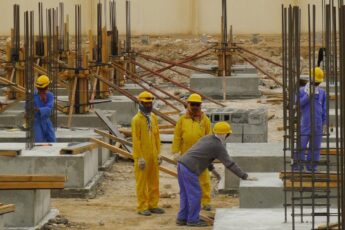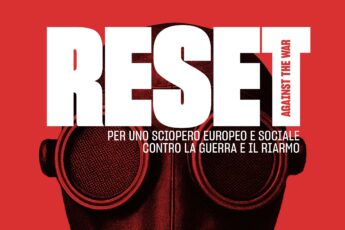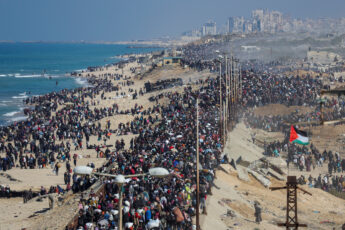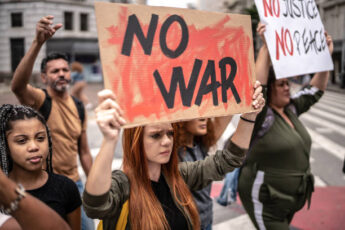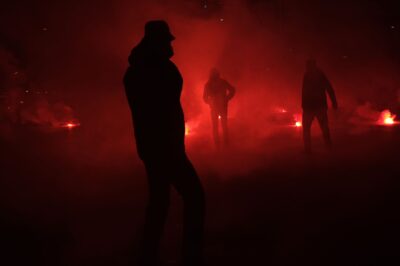
by PRECARIOUS DISCONNECTIONS (Italy)
In response to the call by Palestinian unions, demonstrations and strikes against sending weapons to Israel have taken place in different continents on the morning of November 10. In Kent, England, a blockade stopped an arms factory supplying the Israeli army, while dockworkers in Oakland, Seattle, Barcelona and Sydney organized actions at the same time. In the port of Genoa, Italy, as well, workers organized a blockade of port gates accompanied by a demonstration against the war and military logistics. We discussed this with José from CALP (Autonomous Collective of Port Workers), which organized the demonstration.
The November 10th event was well attended, can you tell us how the day went?
The appointment was at 6:00 a.m. and, against the most hopeful predictions, already at that time there were hundreds of people present. When we saw that the participation was so large, we decided not to limit the blockade to just the San Benigno Gate – which is one of the main passages of the Port of Genoa in terms of container cargo exits – but to extend it to another one, the Albertazzi Gate. This is a mixed passage, both commercial and tourist: classic trucks, trailers and tourists also pass through there.
The reasons for the demonstration are basically those expressed in the appeal launched by the Palestinian unions, which we have made our own. For years, as CALP we have been fighting against arms trafficking, particularly that in civilian ports, because arms produce death and destruction in the places where they then arrive, such as Jeddah, in Saudi Arabia, or precisely in Israel. We wanted not only to characterize yesterday’s demonstration in solidarity with the Palestinian people and their resistance against the genocide carried out by Israel against the people of Gaza, but also to identify what are the crucial points or companies in the war system. In this case, the point was the Zim company (Integrated Shipping Services Zim), which is a shipping company that flies the Israeli flag, has cargo ships and, in an article that came out in the last few days, makes it known that it is offering itself as a logistics infrastructure base to support Israel in this war. There is basically a sea bridge between Israel and the U.S., which is its main arms dealer. Many of the Zim ships pass through Genoa and, like those of the Saudi company Bari, often carry armaments.
So the demonstration was very well attended, around 9 a.m. we moved in a march to go under the Zim headquarters. There we found a police line-up, there was a small throwing of objects and we made a sign “Murderous Israel. Stop the wars, stop the trafficking” and then calmly returned to the main gate of San Benigno.
How have dockworkers reacted? Is there a clear line-up against this new war?
We can say that within the port the line-up on the Palestinian issue is quite homogeneous. Obviously, there is debate and not all the dockworkers are taking sides, but the position is certainly much less divided than on the war in Ukraine. Everyone knows what Israel has been continuing to do for more than seventy years, and there is no doubt about which side to take. Of course, some have less strong positions, which I personally do not agree with, and do not think it is right to talk about resistance, still others are simply defeatist and demoralized. We try to bring some working-class pride, some international solidarity and relate the fact that these wars produce not only death but also poverty. Public resources that should be allocated to schools, health and services are being used in the military.
From a union-level perspective CALP works with USB (Grassroots Syndicate Union): are there other unions in this mobilization?
Yes, other grassroots unions responded: the call on November 10 was made without any kind of official strike and therefore all the people who participated, from unions other than USB but also individuals and movements, did so totally autonomously. In the program we have scheduled moments of discussion, we have written a statement as the National Ports Coordination in which — on behalf of the ports of Genoa, Trieste, Livorno, Naples, Salerno, Civitavecchia, Palermo and Bari — we say that as dockworkers we make our own the words of the Palestinian unions’ appeal that came out on October 16. We are already planning as USB Ports a kind of national mobilization.
We also adhere to the FMS (World Federation of Trade Unions) and there we launched a note to all transport unions in the Mediterranean area, proposing to create a series of mobilizations of Mediterranean ports in solidarity with the Palestinian people. At the moment, the Piraeus dockers and the Turkish dockers, who are the most involved, have joined this call. We are waiting for the response of the French CGT, and the Spanish, Slovenian and Tangier dockers.
Do relations with other Italian ports go through the union or are they autonomous relations? Do the international ones go through FSM?
The contacts we have at the national level have been made through CALP, and some realities have been brought to the union by CALP itself. Other relationships, however, are totally linked to USB. As for international connections, the official ones go through FSM, but we have a whole other set of contacts of our own as CALP that function totally autonomously. Especially with the dockworkers in Marseille, Sète – which is the main port, in fact, in the south of France – and Le Havre. When we start mobilizations, we always communicate with them.
So in this case there was no direct relationship with the dockworkers who organized or announced blockades and actions in Oakland, Seattle, Barcelona, and Sidney?
No, in this case each of us has moved completely autonomously. I believe that Calp’s mobilizations from 2019 to the present, showing how port areas are the last frontier before wars, have in some ways provided an encouragement, if not a model, of how this kind of struggle can be organized.
Since the outbreak of the war in Ukraine, there has been a great difficulty in building a working-class discourse against the war. Your discourse on the role of port logistics in what you rightly call Third World War is in a sense an exception and further highlights the need to build a transnational organization. Where do we stand now?
For the past year and a half, I have been going around all the ports in Europe trying to build a European coordination of dockworkers. A coordination at least, for the moment without a united union structure, but that’s the idea. Next week I am going to attend the TUI (Trade Union International of Transport Workers) congress, which is the transport category within the FSM. There is a huge presence of workers from all port areas there, and I will reiterate the need to create coordinations to connect on both political and purely union issues. The various companies like MSC, Zim, etc., obviously don’t just go to one place, they touch virtually every port in Europe and wherever they are they try to produce the same conditions of putting people to work. Basically, their attempt is to de-regulate the current regulations of port activities, which for them are the real bottlenecks in logistics. Yesterday we blocked an entire port without even declaring a strike.
Inside the FSM are there any other trade struggles that are comparable to those at the ports on the level of transnational organizing?
Yes, airports are the other decisive point through which the war passes. The mobilizations in Pisa last year and Belgium are perhaps the clearest examples of this. The railways, although they are not yet mobilizing, are absolutely central with respect to the movement of weapons to the territories, just look at the images a few months ago of a train passing through Turin loaded with tanks headed to Poland. The transportation system today is absolutely central with respect to the war.
The TSS bet is on the centrality of the strike, a strike, however, thought of as a political practice that is not exclusively about the union or only about stopping production. Do you think that the struggle against weapons logistics is something that has to be only about dockers and transport workers? Otherwise, how can it involve other actors?
For us, the strike is fundamental. On November 10, we did not call the strike, in the technical, union sense of the word, precisely in order to have a strike that was autonomous, political, social and transnational. Using a union organization allows you to speak to the world of labor and is fundamental so that that world of labor itself can understand the reasons for a political strike. If you don’t start with labor, you run the risk of having demonstrations that, like the recent one against Leonardo, are very right but then pit those who work and those who are outside against each other. We must not produce these oppositions. What we want is to find connecting elements between labor and citizens; we have always insisted on these issues. For example: if a ship loaded with high-precision missiles in a port explodes, it blows up half the city, if not the whole city. This is an example of how the issue is not only political and ethical but also a security issue. An organization capable of making hegemony on these two fronts, labor and non-labor, is therefore crucial. We have already practiced this broadening of the strike in anti-racist and anti-government migration struggles. In 2019, at the same time as the blockade of the warship, a ship of migrants was arriving in Genoa and we, along with other comrades, hung a banner on the Lantern – the lighthouse and symbol of the port of Genoa – which read “welcome”. The war system clearly is also central with regard to migrants who are often fleeing wars as well as hunger or the global consequences of ongoing wars.


